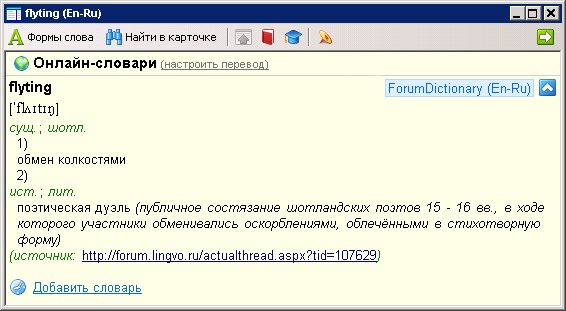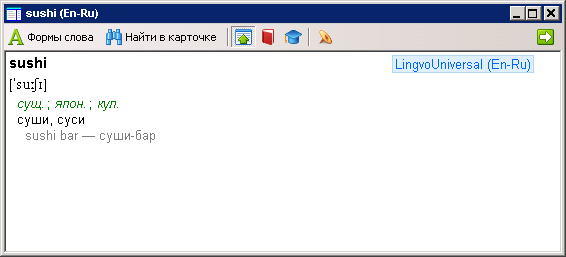Kitchen ABBYY Lingvo: conversations in the ranks!
 Each dictionary entry is a result of not only studying sources, working with materials, checking with dictionaries, but also the result of live communication, often polemics.
Each dictionary entry is a result of not only studying sources, working with materials, checking with dictionaries, but also the result of live communication, often polemics.For the latter, we have a reclamation base - a resource where the errors and lacunae of Lingvo dictionaries found by us or users are recorded and discussed.
We wanted to tell you about the complaint base a long time ago, but everyone didn’t decide - after all, the mecca of our lexicographers, one might say, “sacred cow” for each developer. But what kind of kitchen Lingvo without a complaint base, because it is here that the hottest discussions about how to make a Lingvo dictionary take place!
')
1. Pro cynical Scottish duet-poets
Lexicograph 1:
On the proposal on the forum added article flyting:
flyting
n., shotl.
one)
barbs exchange (demonstrates mastering the art of eloquence)
2)
<ist .; lit.> poetic duel
Lexicograph 2:
I doubt about “ist .; lit. ". At least in Russian, the “poetic duel” is used in the modern context, though in a figurative sense.
Lexicograph 3:
+ this is a poetic duel of offensive nature (it was practiced by the poet of the 16th c., it was a kind of contest that practiced by the talent of abusive verse; also in extended use OxDic).
Lexicograph 1:
I suggest then to issue so:
poetic duel (public contest of Scottish poets of the 15th - 16th centuries)
Lexicograph 3:
This is not just a contest, but a contest consisting in insulting each other in a poetic form.
Translator:
and with particular cynicism
Lexicograph 1:
it seemed to me that the word “duel” already implies some kind of attacks on each other, from the word “poetic” it follows that the attacks were verbal, the essence all the same boils down to a demonstration of one’s own slope as a speaker
Lexicograph 2:
Fixed:
<ist .; lit.> poetic duel ({{public contest of Scottish poets of the 15th and 16th centuries; in the course of the contest, the participants exchanged insults clothed in a poetic form}})
Status changed: Actual -> Fixed
PS The result of this discussion can also be viewed in Lingvo:

2. Sushi in Russian
Lexicographer Trainee (Japanese):
The word sushi translates into Russian as sushi. And Carthage must be destroyed.
Lexicograph 1:
Russian spelling dictionaries already give “sushi, sushi”. Yes, the phonetic transmission rules are violated. But what can you do - usus!
As is known, the process of borrowing foreign lexemes can be: a) direct (directly from the source language), b) indirect (through some other language). The word "sushi" we, nevertheless, borrowed not directly from the Japanese language (then, undoubtedly, it would be "sushi"), but from English. Hence “sushi” (from the English form sushi, according to the rules of phonetic transcription).
What we cannot but agree with is the fact that it is not only the “sushi” option that is given as a translation, but also “sushi” too.
Severity changed: Critical bug -> Suggestion
Lexicograph 2:
“Sushi” are added.
Status changed: Actual -> Fixed
Lexicograph trainee:
The word was borrowed from Japanese (open any publication before 1991) and then re-borrowed again through English. Usus is a use of words, but I would put sushi in the first place, and barbarism in the second place with an explanation that this is a secondary borrowing.
Status changed: Fixed -> Verified
Lexicograph 1:
We do not give comments on “primary / secondary borrowing” in our dictionary. If we give in one particular case, then it will look, at least, strange. Systematically, it’s unrealistic to affix the entire dictionary - there is no time.
Translation equivalents are not available in terms of etymology, but in frequency. In terms of frequency, “sushi” is noticeably ahead.
Regarding secondary borrowing: secondary borrowing usually takes place when the primary one “did not stick down”, was forgotten or continued to be sluggish as local exotism. And in the case of secondary mediated borrowing, we cannot prohibit the intermediate language to influence the form of the word borrowed through it.
Lexicograph 2:
In the Russian language, “sushi” got accustomed (8 million on Yandex, against 202 thousand “sushi”). Until 1991, Russia simply did not have the reality itself and it didn’t matter what they were called.
Lexicograph 1:
Agree. In fact, “sushi” appeared in the language as exotic, non-equivalent vocabulary. “Sushi” is already a designation of a reality that came to us not directly from Japan, after all.
Lexicograph trainee:
Until 1991, the reality was not, and specials. and thin liter about Japan was. Sushi is really more, but there is a growing movement for sushi, and part of the institutions of japanis-style public catering is written in the sushi menu. Deciding which spelling to put in the first place, we designate which side we are on and (more importantly) give one side or the other a powerful argument in holy war.
Status changed: Verified -> Actual
Lexicograph 1:
Colleagues, we do not have time for a long time to mark time. We give both options, placing them in frequency. This is our common principle, which we have been trying to implement in recent articles in our articles. And breaking the spears is not worth it. There are data of explanatory dictionaries of the Russian language, there is data from search engines and shells. We have no right to ignore this data for the sake of our concepts, imitating those researchers for whom there are no wrong concepts, but there are wrong facts.
Lexicograph 2:
I understand and share the professional accuracy of the Japanese, but let's leave, as the Russian language decided, otherwise we will soon start reading and installing Hamlet.
Status changed: Actual -> Fixed
PS Now the sushi article in Lingvo looks like this:

The original of this post was posted on the ABBYY Lingvo team blog .
Natalia Frolova,
Department of Linguistic Products
Source: https://habr.com/ru/post/129014/
All Articles